MercoPress. South Atlantic News Agency
Colombian presidential hopeful says time is ready to end US aid
 Vice-President Francisco Santos
Vice-President Francisco Santos Colombia’s Vice-President Francisco Santos said the country does not need any longer United States funds to combat the narcotics trade and guerrillas movements because time is up “and we don’t need them”.
“I relieve the Colombia Plan achieved its goals…and it’s not necessary now”, said Santos in direct reference to the several billion US dollars with which the administrations of Presidents Bill Clinton and George Bush supported the fight against the drug cartels and their allies the armed revolutionary movements.
In an interview with the country’s main newspaper El Tiempo, Santos, who is tipped as a possible candidate to succeed President Alvaro Uribe indicated that Colombia could continue the fight on its own.
His words seem to contradict statements from President Alvaro Uribe and his Defence minister who consider the US financial aid crucial to continue the fight against drug cartels and insurgency because of budget restrictions in Colombia which make such struggle untenable at its current rate of success.
“The Colombia Plan which helped us very much and was most important at a critical moment from a political angle to police and military actions against the narcotics trade is no longer necessary” added the Vice-President.
Santos also complained about the “undignified” treatment received by Colombian officials from congressional and non government organizations in the US.
US Congress has repeatedly denied the approval of a free trade agreement with Colombia, alleging human rights abuses by military and police forces, in spite of the fact Bogotá has been possibly the staunchest and most reliable Washington ally in South America. Several Latinamerican countries have signed such agreements.
Santos admitted that his statements could signify some kind of “reprimand” from President Uribe, his cousin Defence minister Juan Manuel Santos and the Foreign Secretary Jaime Bermúdez for talking openly about sensitive issues in links with the United States, bur he underlined that “I believe the time has come to assess the political cost of the Colombia Plan and its effectiveness”.
“We’re not only allies and good friends of the US we’re the only country in Latinamerica where the image of the US is positive. In spite of this we are mistreated, and how!!!. That is the cost we have to evaluate vis-à-vis the effectiveness of the plan”.
When asked about his future political aspirations, presidential election in May 2010, Vice-President Santos said that in politics “never say never”.
The Sunday interview follows President Uribe’s statements last week that he would not stand in the way of a close ally in next year’s election, despite efforts by backers to amend the constitution and have him run for a third term.
In an interview with the international agency AP, Uribe refused to rule out another run for the presidency, but suggested he'll give someone else a chance to continue his legacy.
“There are some close allies who are making and are going to make a big push to win the people's favour and get to the presidency,” Uribe said. “I wouldn't be the person to frustrate those efforts”.
In the interview Uribe said he isn't concerned about remaining in power personally, but he wants to ensure that any successor would continue his military crackdown on the rebels, which has brought down kidnapping and murder rates and made Colombia attractive to foreign investment.
Uribe's allies changed the constitution to enable his re-election in 2006, and a third term would require yet another change. While the United States has criticized Uribe's populist rivals in Latinamerica for constitutional amendments removing limits on their re-election, it has so far remained silent on a possible third term for its ally Uribe.
Uribe, 56, was first elected in 2002 and with US assistance of 6 billion US dollars since 2000 to fight drugs and leftist insurgents has seriously hobbled the rebels.
A Gallup poll released last week shows Uribe's domestic popularity at 69%, the first time in six years it has dropped below 70%. The poll of 1,000 people in four cities has a margin of error of 3 percentage points.




Top Comments
Disclaimer & comment rulesCommenting for this story is now closed.
If you have a Facebook account, become a fan and comment on our Facebook Page!